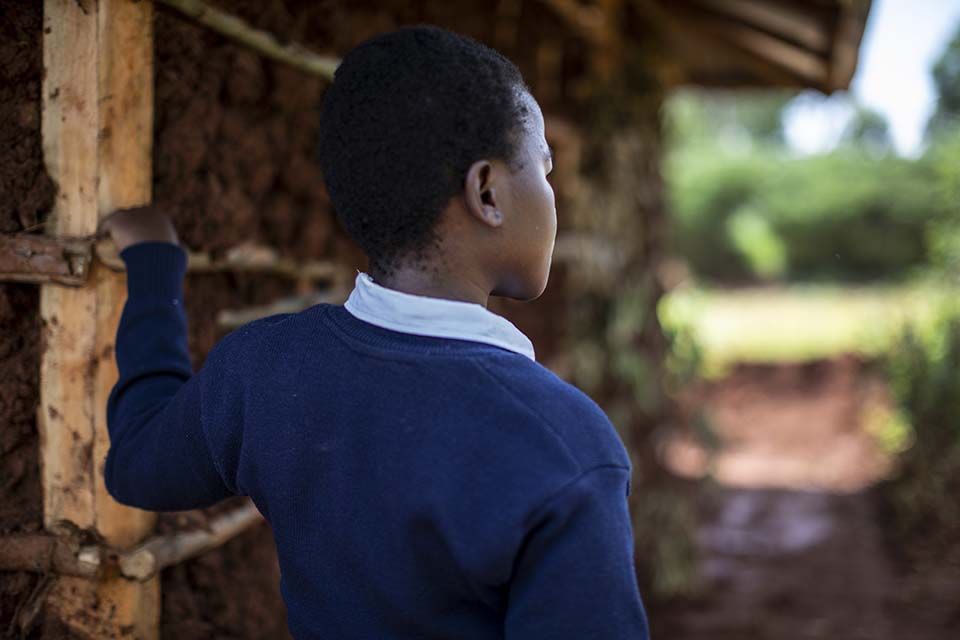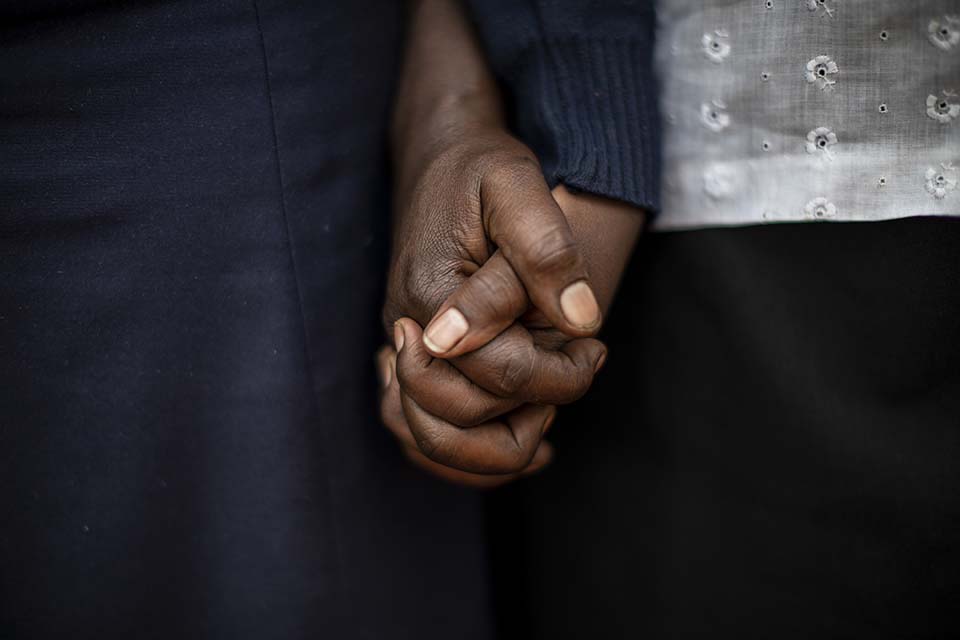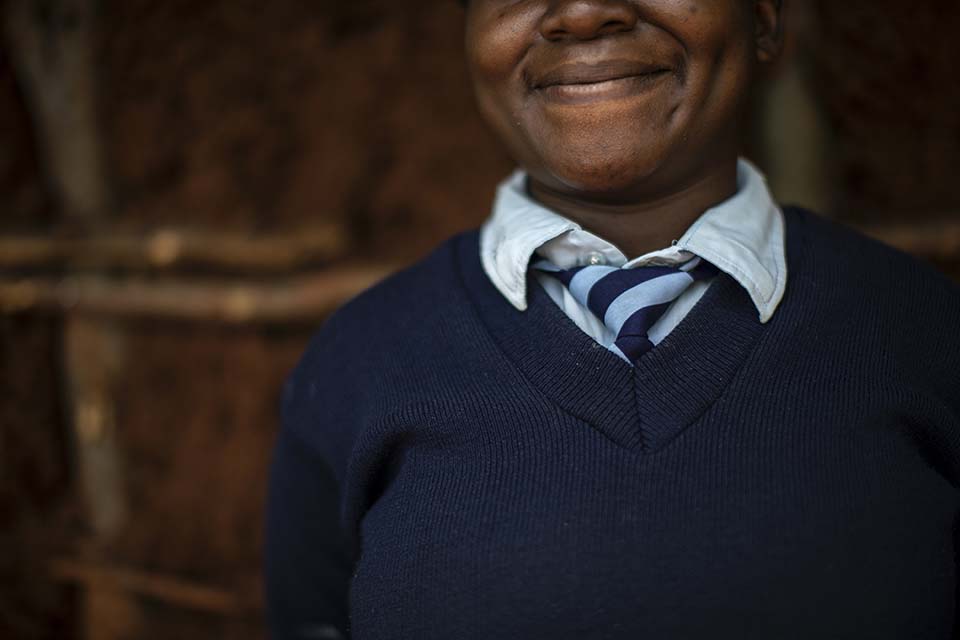

Supporting Children With HIV in Kenya
Caring for a child with HIV is never easy, but Joy* is doing her best to make sure that her 17-year-old daughter, Evelyn*, can lead a full and healthy life.
Joy learned she was HIV positive in 2005, but only began taking medication in 2007 after her two daughters were also found to be positive.

By employing a holistic, child-focused and family-centered approach, the MWENDO project aims to increase access to health and social services for orphans and vulnerable children and their families.
Photo by Will Baxter/CRS
“It was not easy for me to accept that my girls were HIV positive. After we went to the hospital, I came back home and locked myself up in the house. I felt a lot of stress, and I worried a lot. It took me two years to actually accept it,” Joy says.
“Immediately after they were tested, I got them on medication. I made sure they took their medicine as prescribed,” Joy says.
About a year later, Evelyn and her sister Faith got tuberculosis. Both girls initially recovered, but then Faith, who was four years younger than Evelyn, got a second bout of tuberculosis. With her weakened immune system, she was not strong enough to fight off the infection and died shortly after the second bout.
It’s a painful subject for Joy, whose husband also died in 2015 of an AIDS-related illness. Today, she focuses on raising Evelyn, who is in high school.
A normal high school experience
At Evelyn’s school, only the principal and assistant principal are aware of her status.
“I went to the school and talked to them about Evelyn’s status and briefed them on the importance of her taking the medication on time,” Joy says.
Otherwise, Evelyn’s high school experience is like that of any other teenager.
“Because it is just the two school administrators who know about my status, everyone treats me the same, and I don’t feel left out in any way,” Evelyn says.
That sense of normalcy is important. “I try to live a healthy life, both mentally and emotionally,” she says. “I keep myself busy in school, and I find strength in my friends.”

Evelyn* and her mother, Joy*, are both HIV positive and supported by the MWENDO Project, which helps keep Evelyn in school.
Photo by Will Baxter/CRS
Evelyn learned of her HIV status when she was 10 years old and still occasionally takes part in counseling sessions at a nearby health facility. She has moved from the antibiotic Septrin to antiretroviral medication, which she takes in the mornings and evenings.
“I rely on the school schedule,” Evelyn explains. “I know that before I go to morning study hall I should take my medication. I work in the dining hall. Dinner always starts at 6 p.m., so I take my medication before I go.”
The goal of antiretroviral treatment is to reduce the viral load in the patient’s blood until the virus is no longer detectable. At a recent checkup, Evelyn’s test results were lower than the detectable limit, which means the medication is working.
To ensure Evelyn remains healthy, safe, stable and in school, she receives support through MWENDO, a Catholic Relief Services-led project funded by the U.S. Agency for International Development and the President's Emergency Plan for AIDS Relief.
MWENDO helps caregivers provide support to children affected by HIV and AIDS and emphasizes the importance of keeping these children in school. The project does so by improving access to health services, helping families set up and run small businesses, and strengthening the ability of local institutions to respond to child welfare and protection needs. Since its inception, the project has reached more than 250,000 children across 13 counties in Kenya.
Grace Akinyi, a social worker with the CRS partner Women Fighting AIDS in Kenya, stresses the importance of making sure that children impacted by HIV feel accepted at school. The program helps cover school and exam fees, and provides school uniforms and other scholastic materials.
“If we support them by providing items they are lacking, they will have more or less the same as other children and there will be no stigma,” Grace says. “When they stay in school, there will be improved performance.”
The importance of disclosure and treatment
In recent years, Joy has become more active in her community where she counsels others with HIV.
“I talk about the importance of antiretrovirals, disclosure, and about stigma and discrimination,” Joy says. “I tell them not to exclude themselves from others despite their status. I tell them the only difference between them and others is that they are on medication.”
She says that disclosure can be an empowering first step to living a positive life.
“I encourage them that once they know their status, it is important that they disclose it to their loved ones, including their children,” Joy says. “It is good if you can disclose your status to your children, parents and your friends.”
She also explains that they don’t have to go through the process of disclosing their status alone. “They can seek support from someone who understands,” Joy says.
“I also speak to young women, to encourage them that they can still get married and have children. I tell them, ‘Despite the fact that you are HIV positive, you can have a child who is negative,’ ” she says.
Grace points out that disclosure is important because it prolongs life and enhances adherence to medication. “It helps people live a positive life, a life without fear,” she says.

Evelyn* poses for a portrait in rural Vihiga County, Kenya.
Photo by Will Baxter/CRS
Evelyn also has a message of encouragement for other children with HIV.
“I would encourage other children living with HIV to accept their status, take their medication, and not feel left out,” she says. “Because it is not the end of life.”
*Names have been changed to protect identity.

